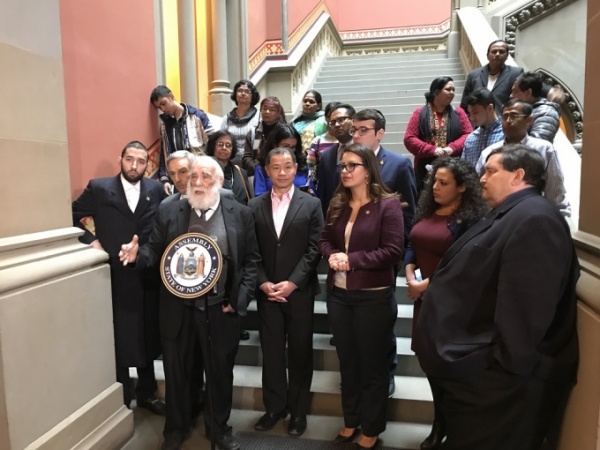
Rabbi Yisroel Rubin, Co-director of the Chabad of the Capital District, speaks alongside Senator John C. Liu, Assemblymembers David I. Weprin, Simcha Eichenstein, Daniel Rosenthal, Catalina Cruz, Natalia Fernandez, Michael Miller, Dr. Dilip Nath, Founder and President of the New American Voters Association (NAVA), Rokeya Akhter, Executive Director of NAVA, and members of NAVA (Photo: Assemblymember Weprin)
March 1, 2019 By Christian Murray
A bill that aims to protect workers from religious discrimination passed the state Assembly Wednesday and is expected to gain passage in the Senate in coming months.
The legislation, introduced by Assemblymember David Weprin, aims protect employees or prospective employees from discrimination on the basis of their religious attire.
The bill prohibits employers from requiring that their employees alter their religious attire, religious clothing or facial hair as a condition of the job. The bill is an extension of previous legislation that protects employees who need to take time off for religious observances.
Employers, in limited circumstances, are able to impose dress requirements if they can show it would cause undue hardship on their business.
The legislation, according to Weprin, was inspired by the case of Kevin Harrington, a Sikh subway operator for the MTA, who was ordered to remove his turban or deface it with an MTA logo.
“With hate cries on the rise, we must make it clear that New York will not tolerate any form of discrimination against people of faith,” Weprin said. “This legislation would ensure that no one is ever forced to choose between adhering to their religious beliefs and earning a living.”
The bill was first introduced by Weprin in 2011 and has passed the Assembly each year since 2013. This year, the bill will be introduced in the senate—now controlled by the Democrats– by John Liu.
“In this day and age, no New Yorker should have to choose between gainful employment and faithful adherence to their religious beliefs,” Liu said in a statement.
4 Comments







The disintegration of this country continues. Hope ya’ll have a backup country to fall back when SHTF!
Oh no, people have religious freedom in a country that guarantees religious freedom?! The disintegration of this country continues!
We are a secular country based on separation of church and state. This is a dangerous precedent.
Just wait until the first woman show up in a full niqab…